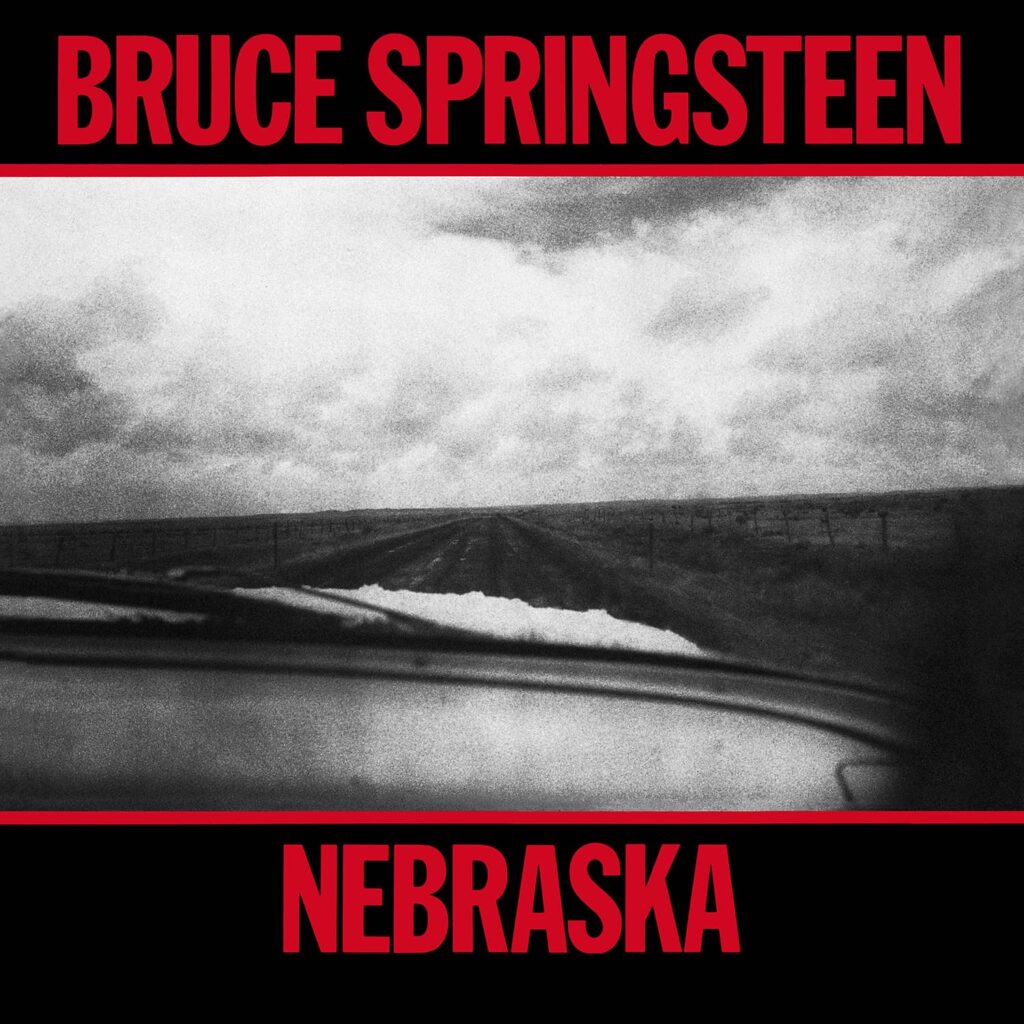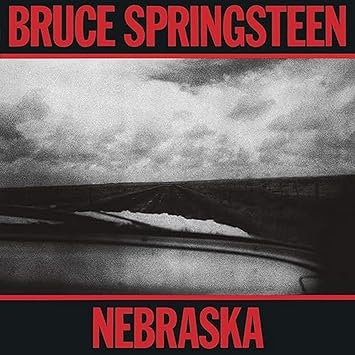
Bruce Springsteen Discography (1982) “Nebraska“
The Bruce Springsteen 1982 album Nebraska stands as one of the most haunting and intimate records in rock history. Unlike his previous work with the E Street Band, this album was recorded as a series of home demos using a simple four-track recorder. Stripped of elaborate production, Nebraska captures a raw, unfiltered look into the bleak lives of its characters—criminals, drifters, and lost souls navigating a harsh American landscape. The album’s storytelling, inspired by real-life events and classic American literature, showcases Springsteen’s ability to craft deeply personal and cinematic narratives.
Despite lacking commercial polish, Nebraska became one of Springsteen’s most critically acclaimed works, influencing generations of songwriters with its stark realism and emotional depth. Songs like “Atlantic City,” “Highway Patrolman,” and the title track paint vivid portraits of desperation, regret, and moral ambiguity. Though it never reached the mainstream success of Born to Run or Born in the U.S.A., Nebraska remains a cult favorite, revered for its authenticity and the bold artistic risk Springsteen took in stepping away from his signature stadium rock sound.
Album Technical Details: Nebraska (1982)
- Artist: Bruce Springsteen
- Album Title: Nebraska
- Release Date: September 30, 1982
- Genre: Folk, Americana, Lo-Fi Rock
- Label: Columbia Records
- Producer: Bruce Springsteen
Recording Details:
- Recording Period: January 3, 1982
- Recording Location: Springsteen’s home in Colts Neck, New Jersey
- Recording Equipment: Teac 144 4-track cassette recorder
- Mixing & Mastering: Later transferred to a professional studio for minor enhancements
- Sound Characteristics: Minimalist, raw, and intimate, preserving the demo-like quality
Tracklist:
- Nebraska
- Atlantic City
- Mansion on the Hill
- Johnny 99
- Highway Patrolman
- State Trooper
- Used Cars
- Open All Night
- My Father’s House
- Reason to Believe
Notable Features & Legacy:
- Intended as demos for a full-band album, but the raw versions were released as the final product.
- Themes of crime, isolation, and the American working-class struggle.
- Inspired by true crime stories, particularly Charles Starkweather’s murder spree.
- Praised for its storytelling, minimalist production, and emotional depth.
- Cited as a major influence by artists across folk, rock, and alternative genres.
Criticism, Curiosities, and Cultural Impact of Nebraska (1982)
Critical Reception:
Upon its release, Nebraska received widespread acclaim from critics, though it was a stark departure from Bruce Springsteen’s previous work. Many praised its haunting minimalism and deeply personal storytelling. Rolling Stone lauded it as a bold artistic risk, highlighting its stripped-down approach as a perfect complement to the album’s dark themes. Some critics, however, questioned whether the lo-fi production limited its potential audience, as the lack of a full-band arrangement made it less commercially accessible. Despite this, Nebraska has since been regarded as one of Springsteen’s most important and influential works, often ranking among his best albums.
Curiosities:
- Demo Becomes the Final Album: Springsteen originally recorded these songs as demos with the intention of re-recording them with the E Street Band. However, when the full-band versions failed to capture the raw emotional depth of the original recordings, he decided to release the demo versions instead.
- Recorded on a Cassette Recorder: The entire album was recorded on a Teac 144 four-track cassette recorder in Springsteen’s bedroom. Its rough, unpolished sound is a result of this simple home setup.
- Inspired by True Crime: The title track, “Nebraska,” was inspired by the murder spree of Charles Starkweather and Caril Ann Fugate in the late 1950s. Their story influenced Springsteen’s perspective on crime, morality, and the American underclass.
- Influence on Other Artists: Nebraska has inspired musicians across genres, including Johnny Cash, Steve Earle, Arcade Fire, and even country and punk artists who admire its stark realism.
- Used in Films and TV Shows: Songs from the album, especially Atlantic City and Highway Patrolman, have been featured in various films and TV series, enhancing their reputation as cinematic storytelling pieces.
Cultural Impact:
- A New Direction for Springsteen: Nebraska signaled a shift in Springsteen’s songwriting, paving the way for the introspective themes of The Ghost of Tom Joad (1995) and Devils & Dust (2005).
- Resonance with the American Working Class: The album’s themes of economic hardship, crime, and moral ambiguity struck a chord with blue-collar America, reinforcing Springsteen’s image as the “voice of the working man.”
- Legacy in Alternative and Indie Music: Many alternative, indie, and folk artists cite Nebraska as a defining influence in their approach to storytelling and stripped-down production.
- A Cult Classic: Despite not being a massive commercial success compared to Born in the U.S.A., Nebraska remains one of Springsteen’s most revered albums among dedicated fans and critics alike.

Limited Edition
LP. Format Vinyl. Click on the image to buy
Access the Complete Discography of Bruce Springsteen in the following link of Bruce Springsteen Radio: https://brucespringsteenradio.com/tag/discography/









